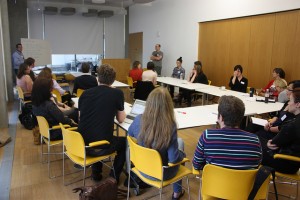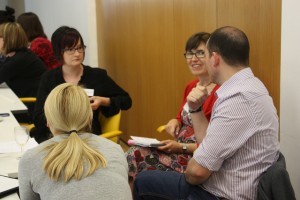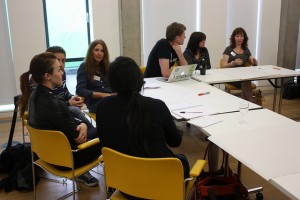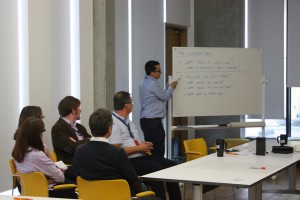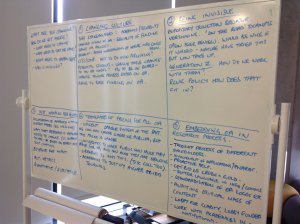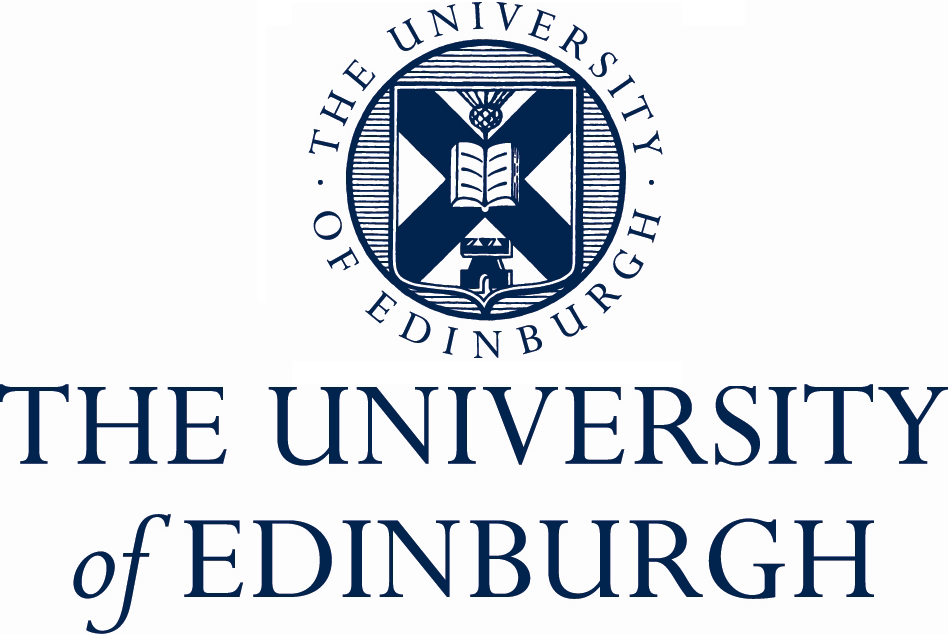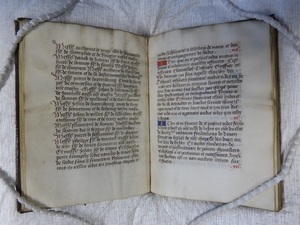Home University of Edinburgh Library Essentials
May 21, 2025
(Open) Heaven is a Place on Earth – or How to Get to Utopia Without Really Trying
Posted on August 13, 2013 | in events, Library | by Blog AdminA guest post from Gareth J Johnson (@llordllama) on the Open Access and Academia Round Table led by Gareth and Dominic Tate on Thursday 1st August. Gareth is a former repository manager and is currently working towards a PhD that is examining issues of culture, influence and power related to open scholarship within UK academia at Nottingham Trent University.
In all the hubbub and hullabaloo of the Repository Fringe about wondrous technological solutions and efforts to bring us to the dawn of a new age of openness in scholarship, we thought it would be worth spending sometime asking the question “So just what would the utopian end point of open access within academia be?” It was, I think you can agree a fairly large question to tackle and one that I don’t think we’ll claim we made conclusive headway in during the 90 minutes. However, as an exercise in attempting to get everyone in the room to step back for a moment from concerns about the REF and having to meet senior institutional management’s expectations, and to consider what the end point of open access would ideally be I think it was a reasonable success.
Brief introductions from those present revealed a constituency comprising mostly repository workers, with a smattering of more technical staff and a publisher or two; which would likely bias the results of the discussions in a certain direction. We started with the precept that the current OA situation in academia couldn’t be perfect, given people’sinterest in attending the session and conference. And at this point asked the first key question:
- What could or would the utopian open access situation in academia look like?
- What is involved?
- Who is involved?
Early suggestions included ensuring that OA was simply built into academics’ natural practice and ensuring that openness in scholarship wasn’t siloed into simply research papers but embraced data, education, sculptures and other expressions of scholarship too. At this point everyone was broken into small groups to discuss these issues.
A broad range of ideas came back from the groups, some of which it was noted are potentially mutually interdependent or diametrically opposed. But as we’d said at the start, this was a utopian view where not everything could or would be achieved. Aspirations ranged from the holistic to the specific with desires for open licences, no embargo periods through transparency for Gold OA pricing to XML over PDF as the standard format. Interestingly given the current UK situation and prevalence of Gold OA, there was some considerable desire for transformation of the scholarly dissemination environment too with calls for open peer review or for institutions to take over the management of the same.
Overall thought the discourse from the groups seemed to suggest a sense that OA should become the norm for academia, that it should be so regular and normal as to almost be engaged with without comment. Embedded and invisible in this way calls for research community engagement would likely find near total compliance.
We asked the groups next to consider which of these activities were in their eyes the most significant, and then to go back and think more about the second of our key questions in relation to it.
- How could or would this be achieved?
- What needs to change?
- What needs to stay the same?
- What needs to happen next?
For the record none of the groups picked the same key task (interesting…) which meant we had 5 separate areas of OA utopia to be worked on as follows:
- Changing the culture
- OA achieving invisibility
- Institutional management of peer review
- Transparent pricing for all OA
- Embedding OA in the research process
What follows are some of the main points that came out:
Culture
- Considering the needs of different stakeholders – students and academics – in scholarly discourse and access.
- Same funding and policies for open access for all disciplines.
- Students to have a more embedded understanding of where their research information comes from – thus not just library led training session on information skills.
- Institutions to do their own publication of monographs and journals, thus everyone would have the same level of understanding.
- OA league tables rather than traditional measures of excellence for recruited new students
- VCs need to be on board with OA as it should impact on every decision made at the university.
- Changing internal promotional for academics through greater recognition of OA outputs.
- HEFCE to fund universities equally based on OA and not funding universities based on traditional institutional outputs.
Invisibility
- Repository Junction Broker making harvesting easier from a centralised point.
- Capturing multiple-versions (ala Jack Kérouac ‘s On the Road which existed in multiple forms) as some scholars want to interact and use earlier/later versions of research.
- Open peer review could support OA. Noted the Nature experiment where this was tried and hadn’t really been taken up by the academic community.
- Issues about who does this peer review and if issues of age/generation of academic impacts on this – would Generation Z academics fit more naturally into an open scholarly culture than Gen X and Baby Boomers.
- Are there penalties for failure to comply with RCUK mandate.
Discussion
Suggestion from the other groups that future generations might not want to reach the same goals for OA as the current movement members – might this mean a shift in an hitherto unexpected direction? Should students be consulted about how and where OA should go was another thought.
Managing Peer Review
- Collaborative approach to be taken within disciplines with champions nominated by institutions to take this forward.
- Academics and editors need to continue to maintain their involvement in peer review, to retain rigour and quality
- The way that research outputs are evaluated needs to be revised and changed, seeing that research has an impact beyond academia and that simple citation counts are insufficient judging criteria of excellence alone. Thus embracing of impact evidence, alt-metrics and a rethink of the whole qualitative vs quantitative value of research outputs is needed.
Discussion
A discussion point that Social Sciences/Humanities work less with citation counts and this would help them to be viewed in an “as valuable as” science way by senior faculty and external auditors. There was also a discussion around the time it takes for non-STEM subjects to become recognised as having achieved impact is much longer; although a counterpoint is that some pharmaceutical research only becomes recognised as significant many years after it has been done as well.
Issues around the ability of scholarly dissemination to transformation and evolve through the auspices of OA were examined as well. In particular a point was raised that methods and routes of communication have evolved considerably in the past couple of decades and yet dissemination of scholarship has not kept pace, a point near to this author’s heart in his own current researches. That researchers it was suggested still function within a print mentality in a digital world was suggested as being perpetuated by the way impact is calculated currently.
Transparent Pricing
- A transparent pricing system for OA is very urgent. The past is an opaque system whereby the library spent money but academics were unaware of the levels. Right now is a golden (no pun intended) opportunity to make the cost of scholarly dissemination made transparent, but it seems there continues to be a danger that we will continue to operate in an opaque system.
- Universities should make public how much funding it has for open access, and exactly what the APCs are for each of the publishers that are available for people to publish with.
- JISC Collections should do this as well, with their memberships to say “This is exactly how much the average APC will be”.
- A nationally coordinated database with this information in, so it would be possible to see who has the best deals with publishers in this respect. This is a role it was suggested for libraries, and be the advisory point within the university for publishing in OA, or publishing in full stop.
- Universities should recommend average APCs for each discipline, so it would be possible for authors to see where they were paying over the odds. And where academics went over the limit, they would have to make a case justifying this – thus allowing other options to be presented to them as well, rather than simply publishing irrespective of cost.
- Fears over burning through APC funds at some institutions too quickly. If universities came in under-costs, then this APC funding could be released back to the research funding streams.
Discussion
Some universities present admitted they were going to be as open as they could be about their funding received and expended, although the level of granularity would vary. It was suggested that the RCUK would not be as transparent as individual universities would be in terms of funding levels. The problem though was that the value quoted and the value paid for APCs could vary due to the time between submission and invoice, and fluctuations in publisher policy and currency exchange. It was highlighted that some publishing work-flows drawn up by some universities locked academics in the route of publishing down more expensive gold routes rather than cheaper gold or green options as a matter of policy. However, other universities countered this with a policy that went down the route of achieving funder policy satisfaction without necessarily taking the “easy” APC route.
Embedding OA
- OA should pervade academic thinking at all stages – from teaching 1st Year Undergrads, or information literacy training. Awareness raising and education about scholarly dissemination should be embraced at every opportunity.
- Getting the finance and research office staff educated about deals and options is key. Researchers might only make the odd publication, but these people deal with the wider institutional publishing framework. If they know about the options they might be able to help steer academics down an OA route that might otherwise be missed.
- Better terminology – green and gold cited as needed to be gotten rid of as terms. Not helped by publishers who it was suggested espoused different views or terms of what OA is, which added to the confusion of academics.
- FOI suggested helps this process, as researchers might have to consider clarity in their work in advance of potential openness down the line.
- Getting independent researchers, those based outside of universities aware and involved in OA was important. Currently we lack a critical mass of OA contents, but in time this could be reached and help them to become aware of it.
- Call for lobbying from academia to lobby for clarity from publishers and funders and attempt to use our influence on academics to help standardised the way they talk about OA.
By the end had we reached utopia? Sadly no, if anything I think we’d underscored the long way there is to go to achieve the final evolution of open scholarly discourse. There are a lot of issues, but at least within the room there was a collegiality and positivity about working towards perhaps achieving some of the goals. Were we to revisit this workshop next fringe – it would be indeed interesting post-REF to see what steps towards achieving some of these hopes, dreams and ideas had actually been made within the UK.
My thanks for our wonderful delegates for their thoughts, the Fringe organisers for giving us the space the run this session; and last but most certainly not least my co-workshop chair Dominic Tate without whom none of this would have been possible.
Collections
 Archival Provenance Project: Emily’s finds
My name is Emily, and I’m the second of the two archive interns that...
Archival Provenance Project: Emily’s finds
My name is Emily, and I’m the second of the two archive interns that...
 Archival Provenance Project: a glimpse into the university’s history through some of its oldest manuscripts
My name is Madeleine Reynolds, a fourth year PhD candidate in History of Art....
Archival Provenance Project: a glimpse into the university’s history through some of its oldest manuscripts
My name is Madeleine Reynolds, a fourth year PhD candidate in History of Art....
Projects
 Documentation Challenges in Practice: Art Collection Barcoding Project
In this week’s blog, our Art Collection Documentation Assistant Gaby Cortes discusses some of the...
Documentation Challenges in Practice: Art Collection Barcoding Project
In this week’s blog, our Art Collection Documentation Assistant Gaby Cortes discusses some of the...
 Sustainable Exhibition Making: Recyclable Book Cradles
In this post, our Technician, Robyn Rogers, discusses the recyclable book cradles she has developed...
Sustainable Exhibition Making: Recyclable Book Cradles
In this post, our Technician, Robyn Rogers, discusses the recyclable book cradles she has developed...

